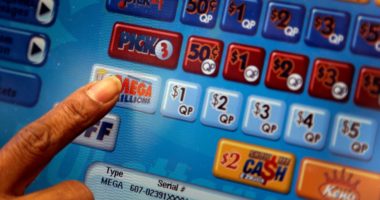Go straight to the content.

Cashless and online sales could soon provide Massachusetts Lottery players with easier methods to participate.
Amidst growing online competition and concerns that Massachusetts is lagging behind other states, lottery and state officials are actively advocating for the relaxation of current restrictions on lottery play.
Advocates of the idea, such as Governor Charlie Baker, believe that by expanding and modernizing lottery access, the already successful program could generate millions of additional revenue.
Officials push new vision of Massachusetts Lottery
Proposals filed by State Treasurer Deborah Goldberg’s office aim to introduce the online segment of the Massachusetts Lottery and enable debit card transactions for products like Mega Millions. The online expansion plan will incorporate safety measures such as prohibiting credit card usage and implementing age verification.
Approval from state legislators is required for any proposal; however, this specific proposal has already gained backing in Baker’s preliminary budget. According to the budget, allowing debit card sales would generate an extra $35 million in revenue.
In order to provide background information, it is anticipated that the Massachusetts Lottery will contribute $985 million towards local aid during the fiscal year 2021. However, there are concerns that the lottery is not fully capitalizing on its ability to generate maximum revenue.
“The risk of becoming obsolete is substantial if we fail to embrace the available technology,” stated Michael Sweeney, the lottery’s executive director, in an interview with The Salem News.
Expanding the lottery would enhance an already thriving industry, which has recently projected its fiscal year 2021 profits to be close to $1 billion. The Massachusetts Lottery ensures that the state’s 351 cities and towns benefit from these profits.
Does MA Lottery need online expansion?
Despite the widespread impact caused by COVID-19, it is surprising to see that the existing projections for FY 2021 closely mirror the earnings of the previous period. This is unexpected as the program heavily relies on in-person sales and games like Keno played in bars and restaurants.
Proponents highlight that despite the unexpected success of the lottery in FY 2021, the motivation to shift towards online sales stems from the uncertainty experienced last spring. They emphasize that things could have been far worse.
Nevertheless, achieving a fundraising total of nearly $1 billion would undoubtedly be a remarkable feat for the Massachusetts Lottery.
Opponents who argue against increased access to gambling highlight the potential risks of gambling addiction and the time required for the state to establish such a practice. They believe that the current situation is satisfactory and question whether the benefits outweigh the drawbacks.
According to Goldberg, ongoing discussions are expected to elicit differing opinions from advocates.
Despite the ongoing influence of the pandemic, the Lottery team has surpassed expectations by adjusting operations to ensure the safety of individuals. We understand the significant value of lottery resources to all 351 cities and towns, particularly at this time, and we remain committed to fulfilling our mission of aiding communities throughout the state.
An evolving landscape in Massachusetts gaming
Goldberg pointed out that if they had the capability to operate online during the spring months, which were severely affected by COVID-19, they could have potentially generated an extra $70 million to $80 million. He highlighted this to convince lawmakers of the significant impact it would have had.
In the meantime, some individuals have emphasized the widespread use of the Massachusetts Lottery app. This app provides features such as ticket scanning, checking winning numbers, accessing live drawings, creating user accounts, and more.
A digital presence will eventually enable players to win medium-level prizes of up to $5,000, further emphasizing its positive impact.
Amidst efforts to legalize sports betting in Massachusetts, news of the lottery’s proposed expansion has also emerged. Governor Baker has submitted a budget plan for 2022, which includes an estimated $35 million in state tax revenue from the anticipated legalization of sports betting.
The financial advantages of legalizing sports betting are expected to outweigh any remaining obstacles, increasing the likelihood of its implementation in the near future. Lawmakers can draw inspiration from the achievements of neighboring states such as Rhode Island and New Hampshire.
If the Massachusetts Lottery is expanded and sports betting is legalized, it would completely transform the state’s gaming industry and potentially generate tens of millions of dollars for the state government.






